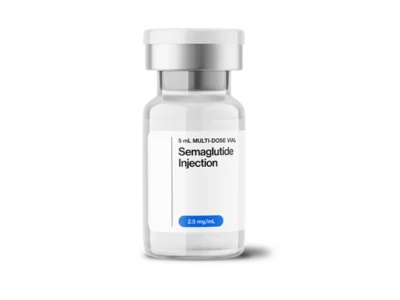- Home
- Growth Hormone
- Growth Hormone
- Growth Hormone Deficiency
- Growth Hormone Therapy
- Growth Hormone Injections
get startedThe Most Effective Hormone Replacement TherapiesIs Semaglutide Safe?
Semaglutide is generally recognized as safe for weight loss when used with proper medical supervision. For most patients, its beneficial effects outweigh any of its potential risks, such as side effects or adverse events.
In 2021, semaglutide became the first drug of its kind to be approved for weight loss. As such, it is generally regarded as safe. So long as you use semaglutide as directed and with proper medical supervision, it is not only quite safe for weight loss, but it can also provide life-changing beneficial effects.
Have you struggled with weight gain? You are not alone. It has been estimated that more than 70% of Americans are obese or overweight. Excess weight can lead to a number of life-threatening conditions, including an increased risk of diabetes, cardiovascular disease, and some cancers. The approval of drugs like semaglutide for weight management has been revolutionizing the field of medical weight loss. Since the results of its initial studies, we have learned a lot more about weight gain and weight loss drugs. Interest in this medication for chronic weight management has been booming, prompting many to wonder, "Is semaglutide safe?"
What Is Semaglutide and How Does it Work?
This medication is part of the GLP-1 receptor agonist class. Like all drugs of this kind, it was originally developed to control weight gain, but to treat type 2 diabetes. Its approval for weight management came as a result of its demonstrated efficacy in controlling weight gain and aiding in weight loss in people with type 2 diabetes. Semaglutide works by mimicking the actions of a natural hormone called glucagon-like peptide-1 (GLP-1), which regulates appetite and metabolism.
Once-weekly semaglutide comes in different dosage forms. The available dosage forms include subcutaneous injections or oral tablets.
When discussing the safety, efficacy, and beneficial effects of this medication, it is crucial to note that it works best when it is used in conjunction with healthy lifestyle interventions.
Why Is Semaglutide Safe?
Once-weekly semaglutide has been well-researched in clinical studies as a solution for weight gain. While it’s relatively new for weight loss, it has been used for many years as an active ingredient in many diabetes medications. As such, doctors and prescribers know a lot about its safety profile, and for most chronic weight management patients, its beneficial effects far outweigh its risks or side effects. One of the main reasons why semaglutide is generally so safe is because it mimics the effect of a naturally occurring hormone and is quite similar to that hormone (GLP-1) chemically and structurally. Overall, semaglutide is well-tolerated. Because of how it works, it can induce some gastrointestinal side effects. However, most of these side effects are mild. In fact, less than 7% of patients in the clinical trials reporting adverse reactions or side effects felt they were severe enough to drop out of the trial and stop taking the drug.
A 2021 study specifically designed to look at the safety of once-weekly semaglutide concluded thusly, "We conclude that semaglutide induces mostly mild-to-moderate and transient gastrointestinal disturbances. No unexpected safety issues have arisen to date, and the established safety profile for semaglutide is similar to that of other GLP-1RAs, where definitive conclusions for pancreatic and thyroid cancer cannot be drawn at this point due to the low incidence of these conditions. Given the beneficial metabolic and cardiovascular actions of semaglutide and the low risk for severe adverse events, semaglutide has an overall favorable risk/benefit profile for patients."
Still, it is not without its potential risks, contraindications, and side effects.
Semaglutide: Risks, Side Effects and Contraindications
The most common side effects of once-weekly semaglutide when prescribed for chronic weight management include nausea, diarrhea, vomiting, constipation, abdominal pain, headache, tiredness (fatigue), upset stomach, and dizziness. Other adverse events include feeling bloated, belching, gas, stomach flu, heartburn, runny nose, or sore throat.
Semaglutide has undergone rigorous testing to ensure its efficacy and safety profile. Semaglutide is now commonly prescribed for weight loss and is generally regarded as safe with few adverse events. However, like any drug or medical procedure, semaglutide does have some potential side effects, warnings, and contraindications.
Warnings, Contraindications, and Other Adverse Events
According to the prescribing information for semaglutide acetate, do not use this medication if:
- You or any member of your family have ever had a type of thyroid cancer called medullary thyroid carcinoma (MTC), or if you have an endocrine system condition called Multiple Endocrine Neoplasia syndrome type 2 (MEN 2)
- You have had a serious allergic reaction to semaglutide or any of the ingredients in semaglutide. Severe allergic reactions have occurred. Seek medical attention immediately if you have trouble breathing or other signs of an anaphylactic reaction.
Before using once-weekly semaglutide, tell your healthcare provider if you have any other medical conditions, including if you:
- Have you had problems with your pancreas, kidneys, or liver, including any history of fatty liver disease.
- Have type 2 diabetes and a history of diabetic retinopathy.
- Have or have had depression, suicidal thoughts, or mental health issues.
- Are you pregnant or plan to become pregnant? Semaglutide may harm your unborn baby. It is recommended that you stop using this drug two months before you plan to become pregnant, are breastfeeding, or plan to breastfeed. It is not known if semaglutide passes into your breast milk.
Patients with diabetes should be sure to tell their doctors about any other diabetes drugs they may be taking before taking semaglutide for weight loss.
Never use this medication without a prescription from a qualified health care professional.
Healthy lifestyle interventions such as adopting a heart-healthy diet, getting enough sleep, and increasing physical activity can all help minimize the risk of side effects.
Adverse effects vary from patient to patient. Read your medication’s package insert for a complete list of warnings, adverse effects and contraindications.
Is Semaglutide Safe for Weight Loss In Specific Populations?
As we have said, semaglutide is generally regarded as safe for patients with obesity, and most side effects are mild and easily mitigated. However, it still may not be for everyone. Here is what the prescribing information says about once-weekly semaglutide’s use in patients with obesity among specific populations:
- Pediatric Use: In pediatric patients, the safety and effectiveness for weight management have thus far only been established in children aged 12 years and older with a BMI corresponding to ≥95th percentile standardized for age and sex.
- Geriatric Use: There have been clinical trials with participants between 65 and 75 years and some that treated patients over 75 years of age. As a treatment for obesity, no overall differences in safety or effectiveness have been observed between patients 65 years of age and older and younger adult patients.
- Renal Impairment: This medication seems to be a safe and effective treatment for obesity in patients with renal impairment. In a study in patients with renal impairment, including end-stage renal disease, no clinically relevant changes were observed in the use of Wegovy in such patients.
- Hepatic Impairment: Once-weekly subcutaneous semaglutide i appears to be safe and effective for patients with hepatic impairment. In a study of patients with different degrees of hepatic impairment, no clinically relevant changes were observed in the use of Wegovy in such patients.
Semaglutide Benefits Beyond Weight Loss
Once-weekly subcutaneous semaglutide offers significant health benefits beyond its primary indication for weight loss:
- Improved Glycemic Control: Originally designed for diabetes, semaglutide helps regulate blood sugar levels.
- Cardiovascular Benefits: Studies show a reduction in major adverse cardiovascular events in patients with or without type 2 diabetes. In fact, semaglutide has shown to be so beneficial in reducing the risk of cardiovascular disease that it can now be prescribed for patients at high risk of heart failure who are obese.
- Reduction in Obesity-Related Conditions: These include improvements in blood pressure, sleep apnea, and joint pain.
For most patients, the beneficial effects of once-weekly subcutaneous semaglutide, including sustained weight loss and reduced risk of obesity-related complications, outweigh the potential risks when used under the medical supervision of a qualified health care professional.
What Is the Safest Semaglutide Dosage for Weight Loss?
One of the ways we ensure that your semaglutide injections are safe is to prescribe the most appropriate dose for your individual needs.
The maximum effective dose of semaglutide is 2.4 mg, administered once a week. The medication comes in a pre-filled pen that you inject under the skin (subcutaneously) of your abdomen, thigh, or upper arm. to achieve the most beneficial effects, your dosage of Semaglutide usually starts at .25 mg and will be increased over the course of your program. The typical titration of dosage is as follows:
- First Month: 0.25 mg once weekly (starting dosage)
- Second Month: 0.5 mg once weekly
- Third Month: 1 mg once weekly
- Fourth Month: 1.7 mg once weekly
- Fifth Month: 2.4 mg once weekly (target maximum dosage)
It does not matter what time of day or night you take your once-weekly injection. However, doctors and pharmacists suggest that whatever time you choose, you do your injection at the same time each week. Semaglutide can be taken with or without food.
Semaglutide pens are premeasured and color-coded with the appropriate dose. The needle is already inside the pen. It is important to keep the pen’s cap on until you are ready to inject it.
How to Ensure Your Semaglutide Injections Are Safe
"Are semaglutide injections safe?" A lot of that is up to you! The safety of semaglutide is also dependent on how you prepare and give yourself your injections.
It is recommended that you rotate your injection sites each week or so to minimize the chances of inflammation or other injection site reactions. Pharmacists say that you should make sure your pen isn’t damaged or broken. Also, look at the liquid in the pen window; it should be clear and never cloudy. Check the expiration date. If the expiration date has passed or the medicine does not seem perfectly clear, throw away the pen and use a new, unexpired pen instead.
Sterility is also very important to avoid infections and injection site reactions. Make sure your hands are thoroughly cleaned before you take your injection. Clean the injection area with an alcohol swab and allow the area to dry completely before injecting your dose. Avoid touching the area after it has been cleaned.
Here are some more tips to ensure the safety of your semaglutide injections:
- Follow Medical Guidance: Always adhere to the prescribed dosage and frequency.
- Start Low and Go Slow: To minimize side effects, dosing usually begins low and is gradually increased.
- Injection Sites: Rotate injection sites to prevent irritation.
- Proper Storage: Store semaglutide pens in the refrigerator until ready to use. Do not freeze.
- Dispose of Needles Safely: Use a sharps container to discard used needles.
How to Safely Stop Taking Semaglutide
The maximum benefits were achieved after a year of injections. However, the treatment period can vary
Treatment discontinuation could increase safety issues and other concerns. Here’s how you should stop taking semaglutide while not compromising its beneficial effects.
- Consult Your Healthcare Provider Before discontinuing semaglutide. Discuss your reasons for wanting to stop the medication and any concerns you may have with your semaglutide prescriber.
- Gradual Tapering: In most cases, your healthcare provider will recommend a gradual tapering-off to avoid adverse reactions and safety concerns. Our healthcare team will reduce your dosage over a period of time rather than abruptly stopping it. The tapering process allows your body to adjust to the change and minimizes potential withdrawal symptoms.
- Follow Medical Advice: Your healthcare provider will create a personalized plan for your treatment discontinuation, taking into account your specific circumstances. It’s crucial to follow their instructions precisely and communicate any side effects or concerns throughout the process. Be sure to tell our healthcare team about any safety concerns you may have before accepting a prescription for this medication.
Semaglutide Safety and Maintaining Results After Your Last Dose
Always keep in mind that weight management is a lifelong journey, and discontinuing semaglutide doesn’t necessarily mean you will regain weight. Maintaining weight loss after discontinuing semaglutide requires a holistic approach to health and wellness. Here are five tips to help you keep the weight off once semaglutide is no longer in your system.
- Healthy Eating: Continue to prioritize a balanced and nutritious diet. Focus on whole foods, plenty of vegetables, lean proteins, and whole grains. Avoid excessive consumption of highly processed or sugary foods.
- Regular Exercise: Incorporate regular physical activity into your routine. Aim for a mix of cardiovascular exercises, strength training, and flexibility exercises to promote overall health, reduce blood pressure, and prevent weight regain.
- Portion Control: Be mindful of portion sizes to avoid overeating. Pay attention to hunger and fullness cues and avoid eating out of boredom or stress.
- Stress Management: Develop effective stress management techniques such as meditation, yoga, or deep breathing exercises to prevent emotional eating.
- Support and Accountability: Maintain regular check-ins with your healthcare provider or a registered dietitian. Consider joining a support group or enlisting the support of friends and family to stay on track.
If you had to stop semaglutide due to side effects or were unhappy with your results, you may want to try taking another weight loss drug. There are other drugs now available. Please contact us today, and we would be happy to discuss your medical weight loss options!
What Does Clinical Research Have to Say About the Safety of Semaglutide?
Numerous clinical trials have evaluated the safety and efficacy of semaglutide for weight loss:
- STEP 1 Trial (2021): This phase 3 trial involved 1,961 adults with obesity or overweight and demonstrated an average weight loss of 14.9% over 68 weeks. Adverse events were primarily gastrointestinal and manageable.
- SUSTAIN-6 Trial (2016): Originally conducted for diabetes, this trial showed semaglutide’s cardiovascular benefits, including a 26% reduction in major adverse cardiovascular events.
- Real-World Data: Post-market studies have reinforced semaglutide’s safety and efficacy when used under proper supervision, with minimal reports of severe side effects.
These studies highlight that semaglutide is both safe and effective for weight loss, provided patients follow prescribed protocols and receive ongoing medical monitoring.
“How Safe is Semaglutide?” Final Thoughts
Health care providers will tell you that the safety and beneficial effects of semaglutide are greatly improved by making lifestyle modifications focused on diet and increased physical activity. In addition, mitigating the potential safety risks of semaglutide in people with obesity has a lot to do with you and your family history. So, open and honest communication with your healthcare professionals is essential. If you want to lose that excess weight, it is imperative to consult with a qualified healthcare provider who can evaluate your medical history, assess potential risks, and determine if semaglutide is a safe and suitable option for you. They will guide you through the correct dosage and monitor your progress to ensure your well-being throughout your weight loss journey.
Semaglutide represents a revolutionary step forward in the treatment of obesity. With the right approach, semaglutide can be a safe and effective tool in your weight loss journey. Why not Contact Us today and see if it is right for you?
Dosing, administration instructions, warnings, and other product information are provided for informational purposes only and should not be construed as any kind of medical guidance or instructions for use. Consult your physician, pharmacist, or full prescribing information for guidance regarding dosing and administration for your particular prescription.
read this next
How Long Does Semaglutide Stay in Your System?
Semaglutide has been proven in clinical outcomes to be quite effective for weight loss. Medical professionals and clinical trials have found people losing dozens…read moreHow To Take Semaglutide
How to take semaglutide is a relatively safe and easy process. Your prescribed dosage of semaglutide will be provided to you in premeasured injectable…read moreHow Long Does it Take to See Results from Semaglutide
Semaglutide has been a game-changer in the field of medical weight loss. When used as directed and when combined with regular exercise and a…read moreWho Should Not Take Semaglutide
Semaglutide, the active ingredient in many of the latest weight loss drugs, can provide remarkable weight loss for many obese adults, but it is…read more - Growth Hormone Therapy
































